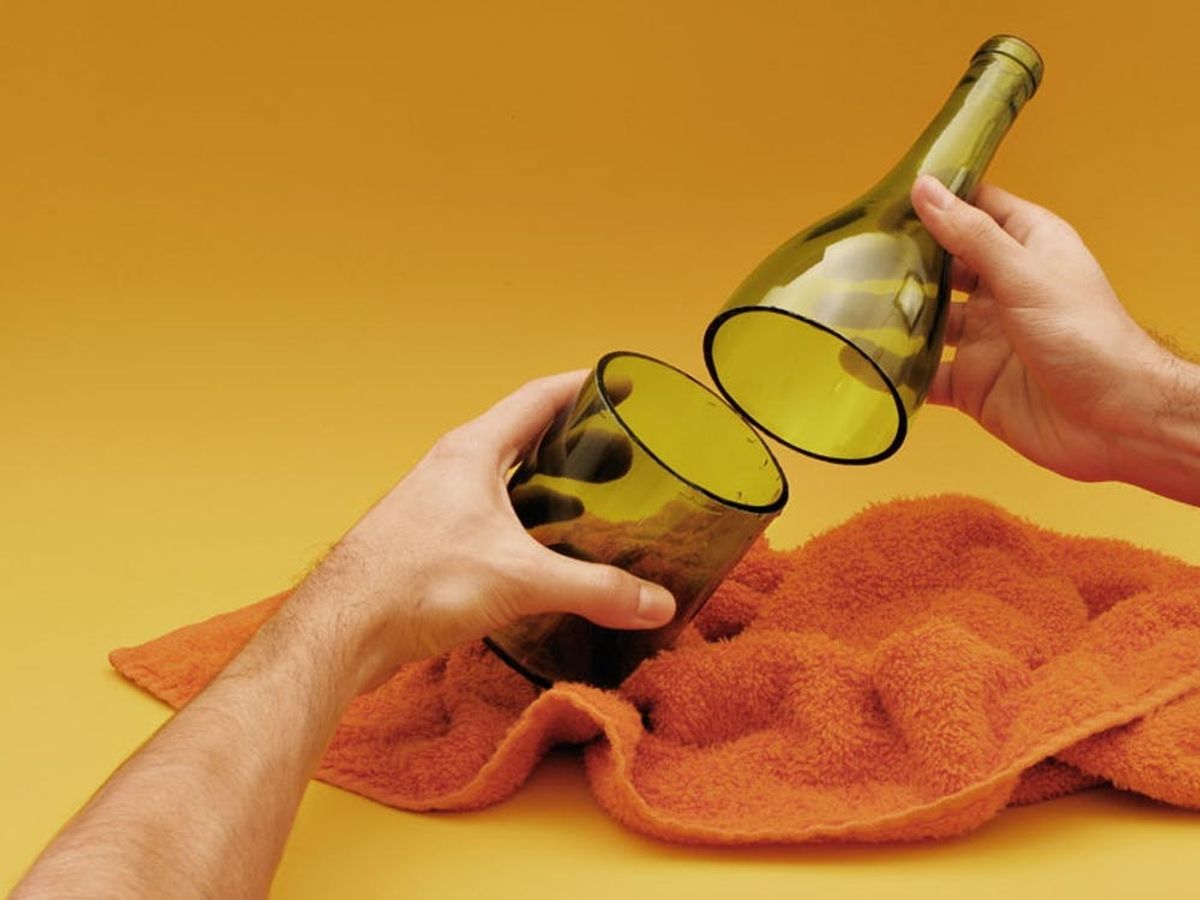
You knew you’d been saving all those wine bottles for a reason! With this in-depth tutorial, we’re pumped to show you how to turn old wine bottles into gorgeous new tumblers. Not only are these green (both in color and in eco-ness), they make a great gift for the holidays and are an instant conversation piece.
This tutorial is definitely on the more advanced end of the spectrum, and requires a few tools you may not be familiar with. As long as you follow the steps you can definitely make it happen, but feel free to shoot questions our way via the comments below or send an email to hello@brit.co.
Materials:
– wine bottles with parallel sides
– bottle cutter (available on Amazon)
– rags or towels
– large pot + potholder
– candle
– 2-3 sheets of dry or wet sandpaper ranging from medium (~150) to fine (~300-400)
– 1 sheet of craft-foam
– safety mask & goggles (not necessary if using sandpaper)
First thing to do is remove those labels. We find the easiest way is to gently boil the bottles in a large stockpot. Be sure to keep them submerged. As soon as the water bubbles for about a minute, you’re ready to peel.
Without emptying the bottle, use a potholder to hold the neck and peel the label off. (Pro tip: Thick labels are way easier to peel off than thin ones.)
Now, it’s time to start cutting your bottle! Bottle cutters don’t actually cut – they just give bottles a nice straight score line. Firm, consistent pressure is best. A nice even score is better than a deep one. Smearing a little oil or grease along the area you’re cutting definitely helps.
Get a pot filled with ice-cold water ready. Now, use a candle to heat the scoreline without actually touching the glass to the flame. Spin and heat the entire line.
When the scoreline is nice and hot, immediately dunk it in the ice-cold water. Within a second, you’ll hear a faint crack or pop. (Pop goes the tumbler!)
Gently lift the bottle out and check that it is cracked all the way around. Wiggle the two halves apart and there you have it! Tumbler success!
On a flat surface, lay a piece of craft foam with your sandpaper on top. Wear goggles to protect your eyes and sand the top of the glass to smooth it over. We recommend starting with medium-grit paper and sand in circular or linear motions. Consistent pressure is best, and not too hard.
When you’re satisfied with the edge, switch to fine or extra-fine grit paper and buff the edge with gently pressure. Periodically wipe the edge with a damp rag as you work during both stages.
Sand a bit on the inside and outside edge to create a subtle bevel, and you’re done!
That is, unless you want to get your etching on! Here’s how to do it.
Etching Materials:
– contact paper
– permanent marker
– Xacto knife
– etching fluid (available on Amazon)
– soft paintbrush
Cover the surface of the glass with enough contact paper to make a stencil of your design.
Draw your design directly on the contact paper.
Use an Xacto knife to trace over your design. Peel of the positive areas of your stencil. Cover the design with etching fluid using soft paintbrush. Gently massage the fluid over the whole design but be careful not to disturb the edges of your stencil with brush bristles.
Once you have a thick consistent layer built up, let sit for 5 minutes and wash the fluid off.
And there’s your stencil! We went for Command + A (aka “Select All”), because we love it all! :)



















